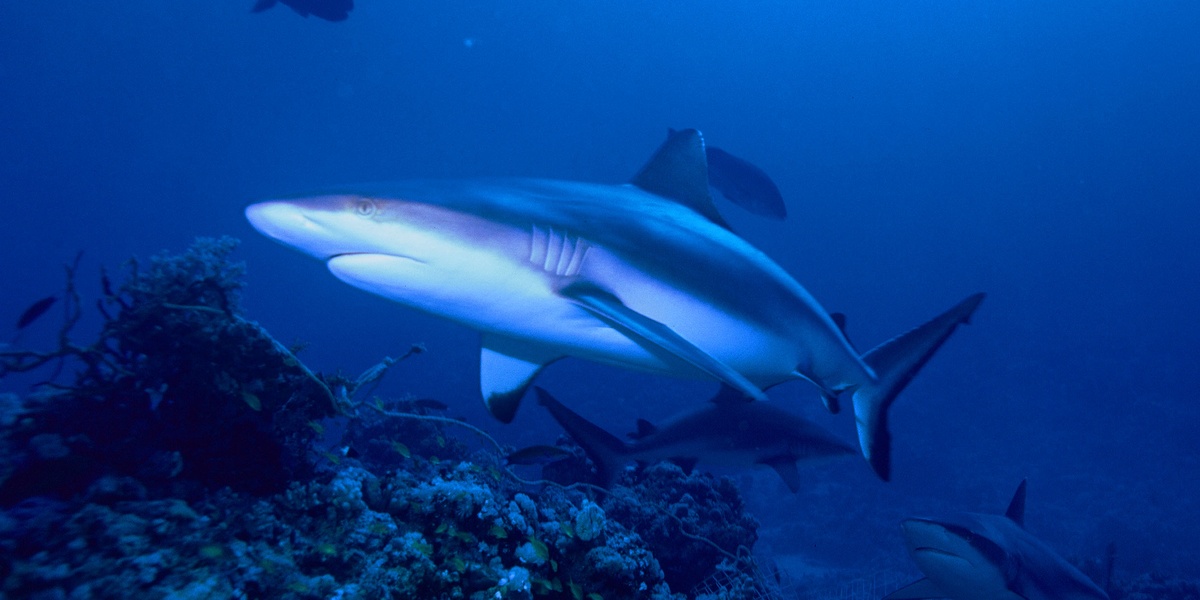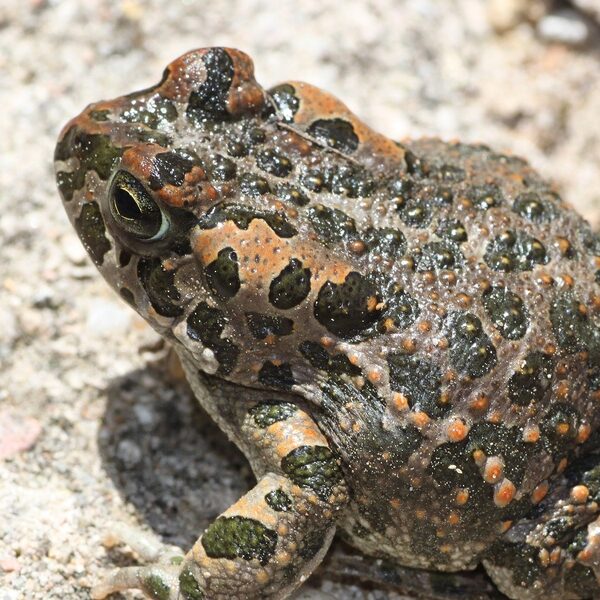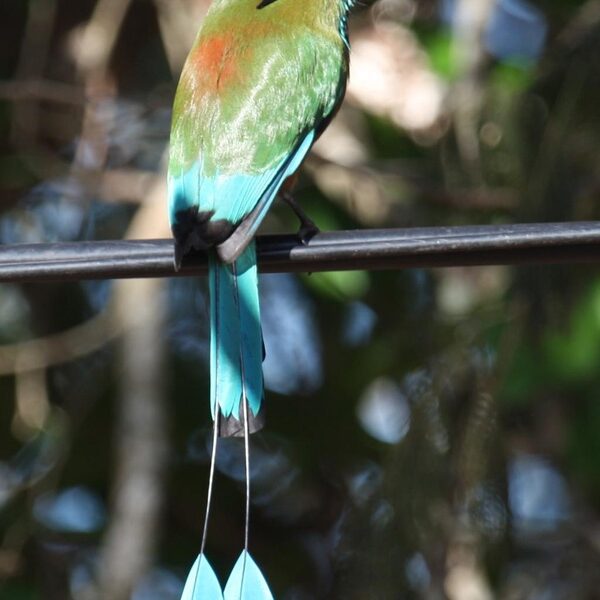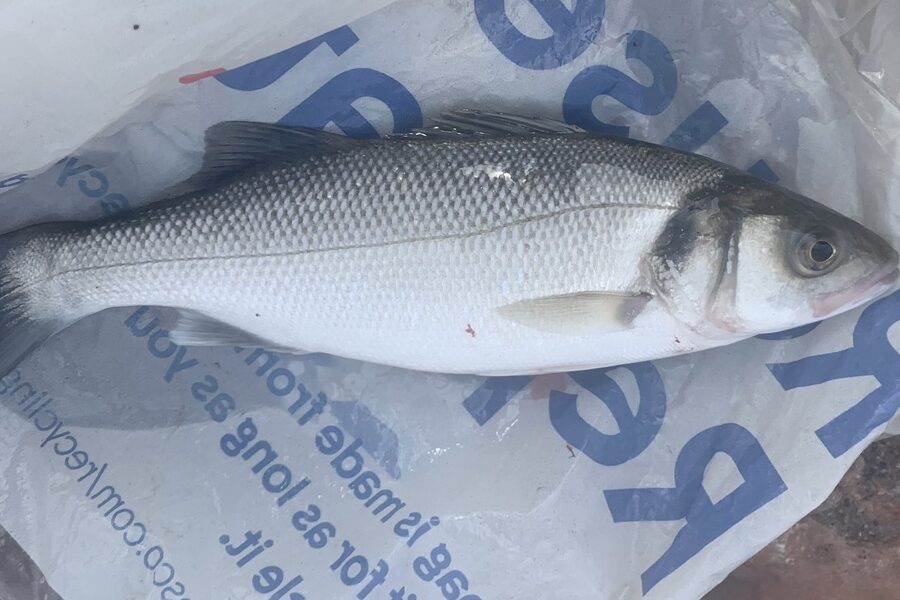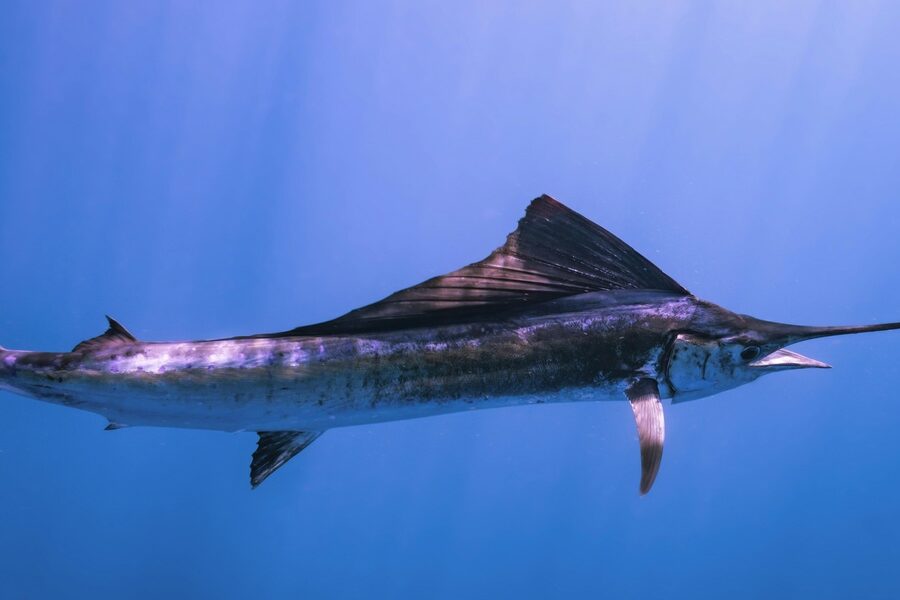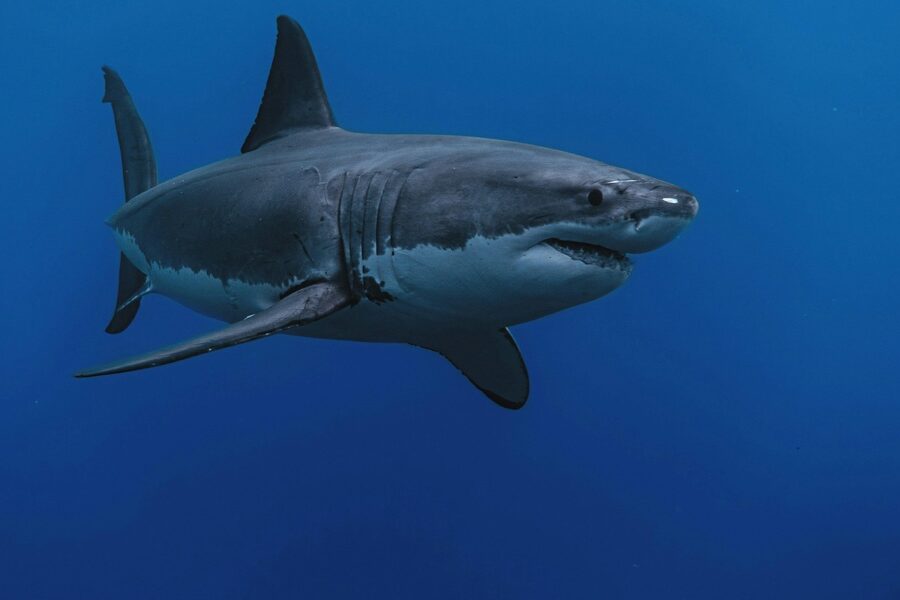Coral reefs are dynamic hotspots where predators help shape community structure, from shallow patch reefs to steep outer slopes. Observing who hunts where reveals patterns in behaviour, size and diet that matter for monitoring and conservation.
There are 35 coral reef predators, ranging from Blacktip Reef Shark to Yellow Goatfish. For each species you’ll find below Scientific name,Size (cm),Diet & hunting method so you can quickly compare identification, typical size and hunting strategy — you’ll find below.
How do reef predators influence the overall health of a coral reef?
Predators control prey populations, which can prevent overgrazing or overgrowth that harms coral cover; shifts in predator numbers often cascade through the food web, changing algal growth, fish community composition and reef resilience.
What’s the best way for divers to observe predators without disturbing them?
Keep distance, move slowly, avoid sudden flashes or loud noises, and watch from a stationary position; many predators resume natural behaviour when not harassed, letting you note size, markings and hunting method without altering the scene.
Coral Reef Predators
| Name | Scientific name | Size (cm) | Diet & hunting method |
|---|---|---|---|
| Great Barracuda | Sphyraena barracuda | 200 | Feeds on fish; ambush predator using speed and surprise |
| Giant Trevally | Caranx ignobilis | 170 | Preys on fish and cephalopods; high-speed pursuit and ambush |
| Bluefin Trevally | Caranx melampygus | 120 | Hunts schooling fish with chasing and ambush near reef edges |
| Leopard Coral Grouper | Plectropomus leopardus | 100 | Ambushes fish; stalk-and-strike from coral ledges |
| Goliath Grouper | Epinephelus itajara | 250 | Ambushes fish and crustaceans; suction feeding from crevices |
| Nassau Grouper | Epinephelus striatus | 140 | Nighttime ambush predator on fish and crustaceans |
| Mutton Snapper | Lutjanus analis | 100 | Feeds on fish and crustaceans; nocturnal foraging near reefs |
| Cubera Snapper | Lutjanus cyanopterus | 180 | Ambushes large fish; uses cover and rapid lunges |
| Lionfish | Pterois volitans | 45 | Ambushes and stalks small fish using venomous fin rays |
| Blacktip Reef Shark | Carcharhinus melanopterus | 180 | Pursues fish and cephalopods; active patrols of shallow reefs |
| Whitetip Reef Shark | Triaenodon obesus | 170 | Nocturnal hunter of fish and octopus in crevices |
| Grey Reef Shark | Carcharhinus amblyrhynchos | 210 | Hunts fish schools; group hunting and fast pursuits near drop-offs |
| Nurse Shark | Ginglymostoma cirratum | 330 | Forages on crustaceans and fish using suction feeding at night |
| Giant Moray | Gymnothorax javanicus | 300 | Ambushes fish and octopus from reef holes and crevices |
| Longnose Hawkfish | Oxycirrhites typus | 15 | Perches to snatch small fish and crustaceans among corals |
| Day Octopus | Octopus cyanea | 120 | Active hunter of crustaceans and fish using stalking and jetting |
| Blue-ringed Octopus | Hapalochlaena lunulata | 12 | Ambushes small crustaceans and fish using venomous bite |
| Crown-of-thorns Starfish | Acanthaster planci | 80 | Consumes coral polyps by everting stomach and digesting tissue |
| Titan Triggerfish | Balistoides viridescens | 75 | Forages on urchins and crustaceans by crushing and tossing coral rubble |
| Stonefish | Synanceia verrucosa | 45 | Ambushes fish and crustaceans using camouflage; venomous spines |
| Spotted Scorpionfish | Scorpaena plumieri | 40 | Ambushes small fish and crustaceans from reef substrate |
| Giant Frogfish | Antennarius commerson | 40 | Lures and engulfs small fish using movable lure and rapid suction |
| Peacock Mantis Shrimp | Odontodactylus scyllarus | 18 | Smashes mollusks and crustaceans with club-like appendage |
| Napoleon Wrasse | Cheilinus undulatus | 200 | Feeds on hard-shelled prey; crushes crabs, mollusks, and starfish |
| Dusky Dottyback | Pseudochromis fuscus | 12 | Ambushes juvenile fish and small crustaceans from crevices |
| Sargassum Squirrelfish | Sargocentron spiniferum | 35 | Nocturnal feeder on small fish and crustaceans among coral crevices |
| Cornetfish | Fistularia commersonii | 200 | Stalks and sucks small fish while drifting among corals |
| Spotted Eagle Ray | Aetobatus narinari | 350 | Digs for mollusks and crustaceans; flips substrate with snout |
| Bluespotted Ribbontail Ray | Taeniura lymma | 70 | Forages for small fish and invertebrates on reef flats and lagoons |
| Olive Sea Snake | Aipysurus laevis | 120 | Active hunter of eels and reef fish using venomous bite |
| Cone Snail | Conus textile | 12 | Envenomates fish and worms with harpoon-like radula; ambush hunter |
| Giant Sea Anemone | Heteractis magnifica | 100 | Captures fish and shrimp with stinging tentacles and symbiotic clownfish |
| Pufferfish (Masked Puffer) | Arothron nigropunctatus | 90 | Crushes mollusks and crustaceans using strong beak-like teeth |
| Hogfish | Lachnolaimus maximus | 100 | Forages for crabs and mollusks by digging in sand among reefs |
| Yellow Goatfish | Mulloidichthys martinicus | 45 | Digs for benthic invertebrates and small fish using barbels |
Images and Descriptions
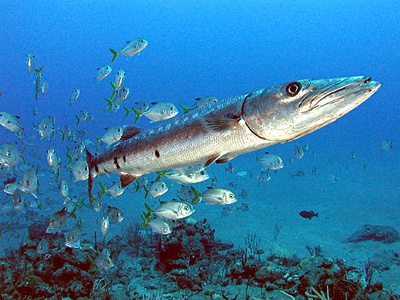
Great Barracuda
Large, widely distributed predatory fish in tropical and subtropical reefs of Atlantic and Indo-Pacific. Uses bursts of speed and stealth to ambush schooling fish. Seen by divers; apex mesopredator that shapes reef fish behavior and food webs.
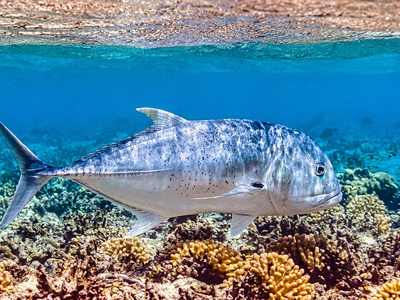
Giant Trevally
Powerful jack found on Indo-Pacific reefs and seaward drop-offs. Hunts fish, crustaceans and squid using rapid charges and coordinated group attacks. Top predator in reef lagoons, feared by prey and prized by sport fishers.
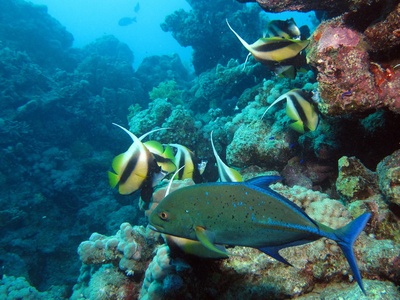
Bluefin Trevally
Common Indo-Pacific reef jack that chases schools and ambushes prey near coral heads. Forms hunting packs and uses speed to corral baitfish. Important mesopredator influencing small fish distributions and reef fish community structure.
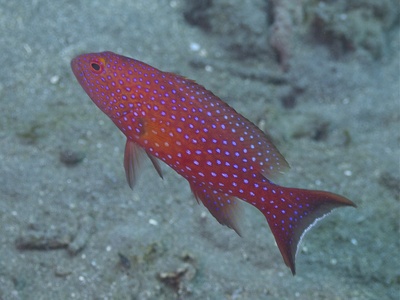
Leopard Coral Grouper
Colorful Indo-Pacific predator that lies in wait around coral bommies to pounce on reef fishes. Popular with anglers and ecologically important for controlling smaller fish populations; often solitary and territorial.
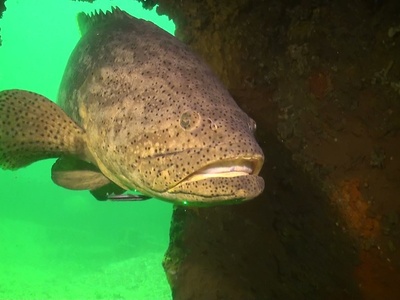
Goliath Grouper
Massive Atlantic reef grouper occupying rocky and coral habitats from Florida to Brazil. Eats fish, crabs and octopus by inhaling prey into large mouths. Slow-moving apex mesopredator vulnerable to overfishing and local declines.
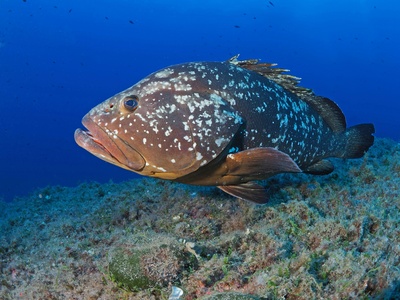
Nassau Grouper
Caribbean reef grouper known for seasonal spawning aggregations. Hides in caves and crevices by day, emerging at night to feed on fish and crustaceans. Long-lived, commercially valuable, and threatened by fishing.
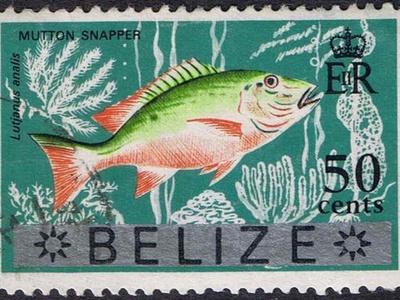
Mutton Snapper
Common Caribbean snapper that hunts small fish, squid and crustaceans around reef edges. Active at dusk and night, it links reef and deeper habitats and supports local fisheries.
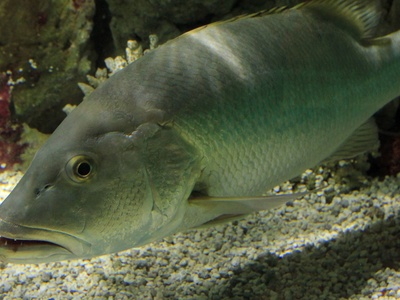
Cubera Snapper
Large western Atlantic snapper frequenting reefs and wrecks. Preys on fishes and cephalopods, often striking from structure. Mature individuals are top predators and targeted by anglers. They shape local fish communities.
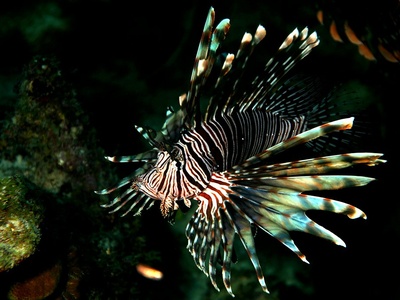
Lionfish
Invasive Atlantic species native to the Indo-Pacific, now abundant on Caribbean reefs. Voracious predator of small fishes and crustaceans; alters reef food webs and competes with native predators. Venomous spines deter predators.
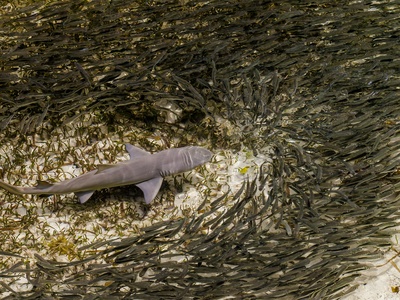
Blacktip Reef Shark
Small, agile reef shark widely distributed in Indo-Pacific lagoons and reef flats. Hunts by patrolling shallow water and making rapid turns to capture fish and squid. Common and familiar to snorkelers.
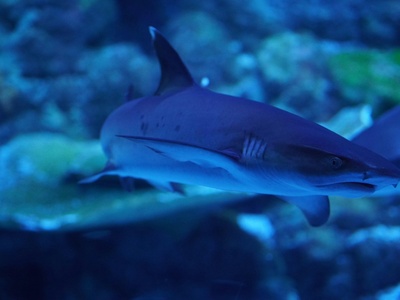
Whitetip Reef Shark
Slender Indo-Pacific reef shark that rests in caves by day and hunts at night for fish and octopus among coral crevices. Slow-moving but effective nocturnal predator with site fidelity.
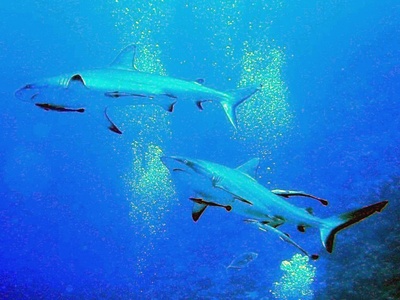
Grey Reef Shark
Abundant on outer reefs of the Indo-Pacific, often forming groups that patrol drop-offs. Feeds on schooling fish and cephalopods; vital apex predator influencing reef fish behavior near deep reef edges.
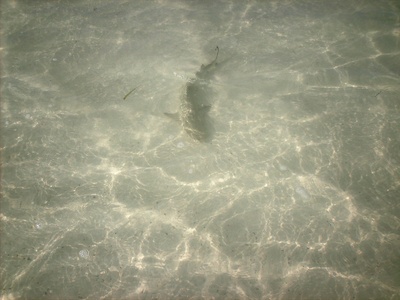
Nurse Shark
Bulky, nocturnal Atlantic shark inhabiting reef caves and ledges. Suctions crabs, lobsters and fish from crevices while foraging at night. Generally docile but capable of strong bites if provoked.
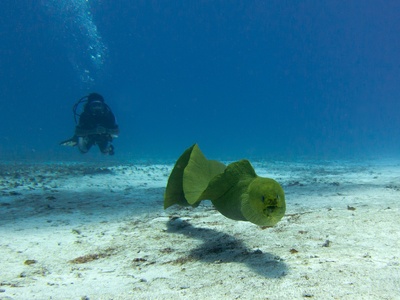
Giant Moray
Large Indo-Pacific moray eel commonly seen poking from coral crevices. Ambushes fish and octopus, sometimes hunting cooperatively with groupers. Powerful bite and secretive daytime hiding behavior.
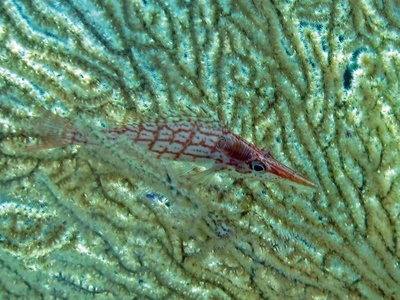
Longnose Hawkfish
Small Indo-Pacific reef fish that sits on gorgonians and coral branches to pick off small crustaceans and fish. Ambush predator with bold behavior and a favorite among aquarium enthusiasts.
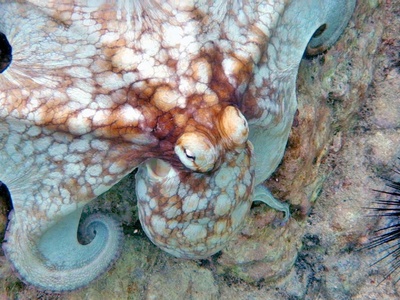
Day Octopus
Widespread Indo-Pacific octopus that forages on coral reefs by day. Uses camouflage, probing and rapid jetting to catch crabs, snails and fishes. Intelligent, solitary predator noted for problem-solving.
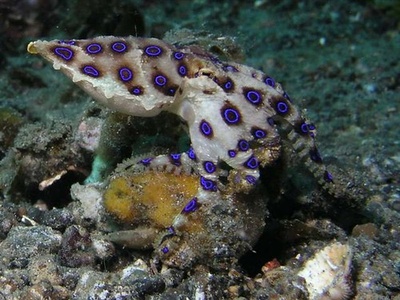
Blue-ringed Octopus
Tiny but highly venomous Pacific octopus living in reef tide pools and crevices. Hunts small crabs and shrimp; potency of venom makes it dangerous despite small size. Secretive and rarely seen.
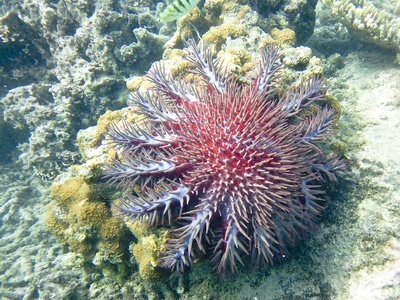
Crown-of-thorns Starfish
Large, many-armed starfish in Indo-Pacific that preys directly on live coral polyps. Outbreaks cause devastating reef damage, altering habitat and food webs; controlled naturally by predators and human intervention.
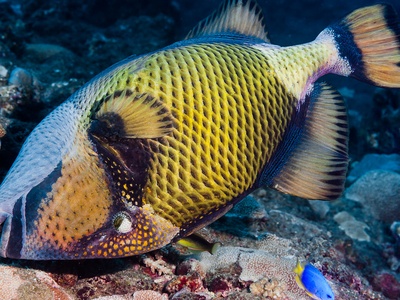
Titan Triggerfish
Bold Indo-Pacific reef triggerfish that digs into sand and coral to extract urchins, mollusks and crustaceans. Can become territorial and aggressive around nests; important benthic predator shaping sea urchin populations.
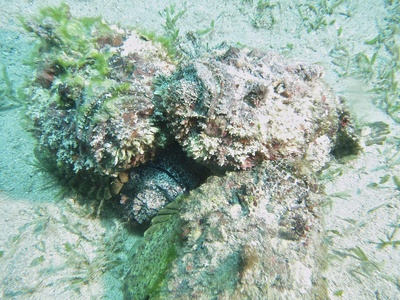
Stonefish
Well-camouflaged Indo-Pacific ambush predator often sitting motionless on reefs. Strikes passing fish and invertebrates with explosive mouths; highly venomous spines make it one of the most dangerous reef fishes.
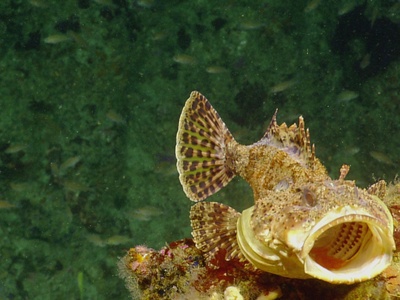
Spotted Scorpionfish
Cryptic Atlantic scorpionfish that blends into rubble and coral to surprise prey. Feeds on small fishes and crustaceans; venomous spines provide defense while it lies motionless awaiting prey.
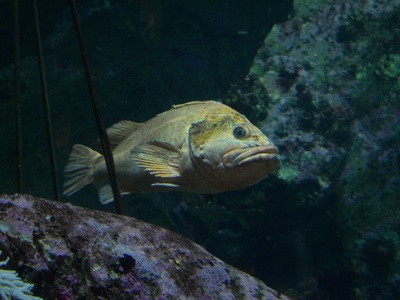
Giant Frogfish
Camouflaged ambush predator found in tropical reefs worldwide. Uses a fleshy lure to attract prey, then engulfs fish with a rapid suction strike. Masters of disguise, often overlooked by divers.
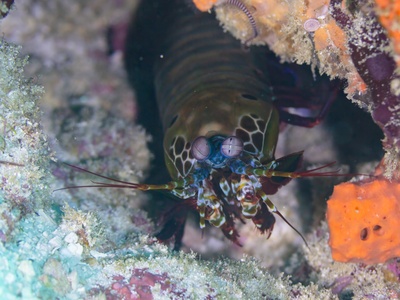
Peacock Mantis Shrimp
Colorful stomatopod inhabiting Indo-Pacific coral rubble and crevices. Delivers blindingly fast strikes to crush shells and stun prey. Powerful predator influencing invertebrate populations and local reef microhabitats.
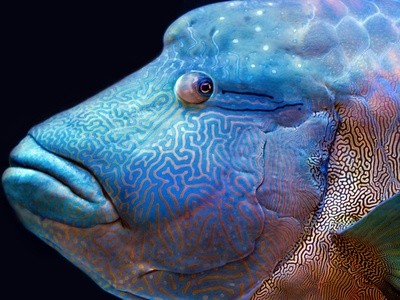
Napoleon Wrasse
Large, long-lived Indo-Pacific reef fish that eats crustaceans, mollusks and toxic crown-of-thorns starfish. Important for reef health and vulnerable to overfishing due to slow maturity and targeted fisheries.
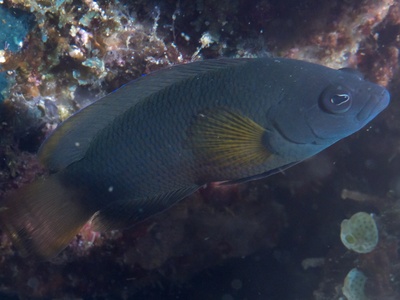
Dusky Dottyback
Small but aggressive Indo-Pacific reef predator that raids crevices for juvenile fishes and shrimps. Influences recruitment and behavior of young reef fish; common in rock and coral habitats.
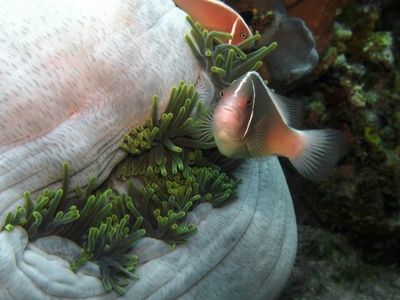
Sargassum Squirrelfish
Red, spiny-eyed Indo-Pacific squirrelfish that shelters in caves by day and hunts at night. Feeds on crustaceans and small fishes, serving as a mid-level nocturnal predator on reefs.
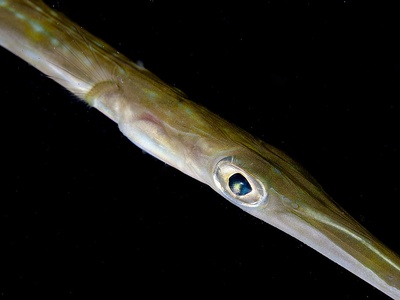
Cornetfish
Slender Indo-Pacific and Atlantic species that creeps through coral branches to feed on small fishes. Uses stealthy approach and suction feeding; often seen hovering vertically among gorgonians.
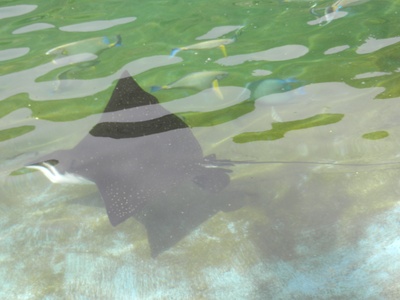
Spotted Eagle Ray
Large, graceful ray found over reefs and sandy flats worldwide in tropical seas. Feeds on benthic mollusks and crustaceans by uncovering prey with powerful snout flips. Important predator of shellfish.
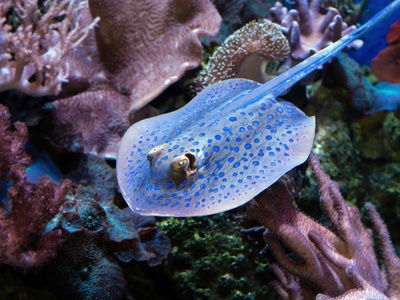
Bluespotted Ribbontail Ray
Small Indo-Pacific stingray that hunts crustaceans, worms and small fishes on reef sand and rubble. Bright blue spots warn predators; often buries itself and feeds by detecting buried prey.
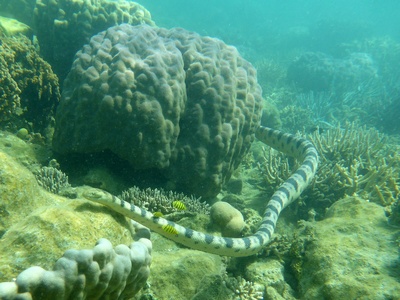
Olive Sea Snake
Reef-associated sea snake in the Indo-Pacific that hunts eels and small fishes among coral branches. Venomous and highly aquatic, it spends almost all of its life hunting on and around reefs.
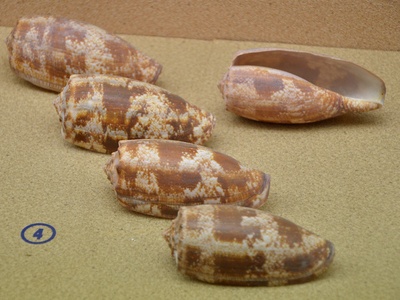
Cone Snail
Venomous predatory snail found on tropical reefs that immobilizes fish and worms with a toxin-laced harpoon. Slow-moving but deadly, cone snails are specialized reef hunters with complex venoms.
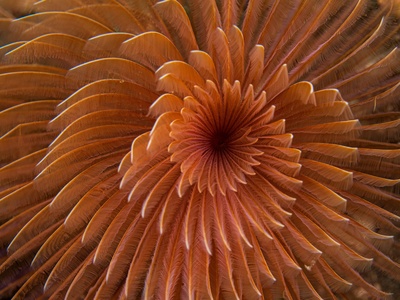
Giant Sea Anemone
Large Indo-Pacific anemone anchored to reef that captures passing fishes and crustaceans with nematocysts. Hosts clownfish and plays a role as a sessile predator and habitat provider on coral reefs.
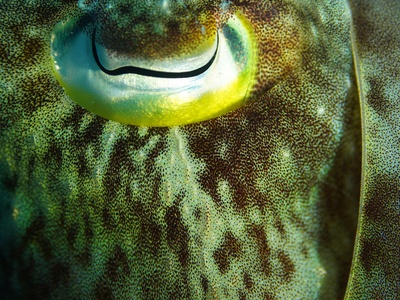
Pufferfish (Masked Puffer)
Large Indo-Pacific puffer found on reefs that feeds on hard-shelled invertebrates and occasional fish. Uses powerful jaws to break shells; can inflate and has tetrodotoxin for defense.
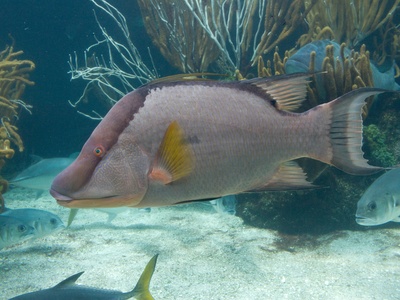
Hogfish
Western Atlantic reef wrasse common on Caribbean reefs. Uses a protrusible mouth to root out crabs and mollusks from sand and rubble. Important predator controlling benthic invertebrate populations and sought by fisheries.
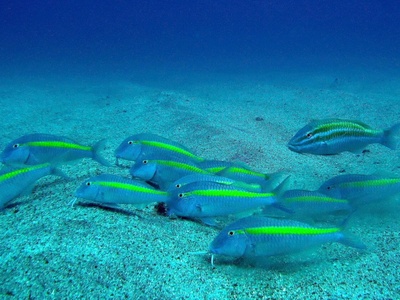
Yellow Goatfish
Caribbean reef fish that forages on sand and rubble for worms, crustaceans and small fishes using sensory barbels. Forms schools and links benthic prey dynamics with higher predators on the reef.
